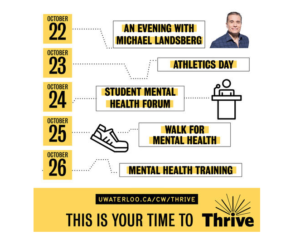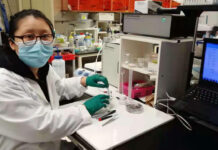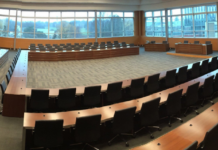by Harleen Kaur Dhillon, Charlotte Hings, Sarah Mazen
To Grace Stemp-Morlock thriving is flourishing and to propering, while growing and developing. “The last year in UW has been a very difficult one in terms of MH on campus and i think every opportunity to help students keep surviving is very important.” the Lego artist and UW alumnus, said.
Mental health affects everyone, and to strengthen it, it is important to learn about it, think, talk about it and discover healthy coping skills and resources to thrive all year.
From Oct 21 to Oct 26, UW celebrated Thrive Week, a week dedicated to mental health awareness, skills, and resources. Various groups all over campus provided events, resources, and discussion forums to promote mental health care and help students maintain their mental health.
A variety of events were offered throughout the week. From dog therapy at St. Paul’s to Cookies ‘n’ Rocks at St. Jerome’s to creation of Self-care Kits on campus libraries, groups across the campus worked together to further the goals of Thrive Week.
The last few years have been difficult for the UW community as we mourn the loss of a few of our students. At times like these, raising awareness and providing resource for mental health is priority.
Stemp-Morlock ran the Building for Change – Lego Art Mental Health Exhibit, where she presented her own lego creations and provided others the opportunity to build their own.
UW has a reputation for its academic prestige, but this reputation sometimes comes at the price of students’ mental health.
“We’re known for being workaholics and that’s the issue, we need to recognize that there’s more than just the academic sensibles [sic],” Justin Doyle, a Social Work student and organizer of Dog Therapy at St. Paul’s said.
“Reaching out and grabbing the resources that are needed to help the student thrive [is important] because we want to build a community of strong, resilient students and if we’re only focused on academics, we’re not focusing on the whole person,” Doyle said.
The members of of the UW community have many ideas for the best steps forwards for a mental-health aware campus.
Kaitlyn Chorowiec, a Psychology and Peace and Conflict Studies student and Library Ambassador, was part of the team that organized Self-Care Kits in the UW libraries.
“We need to thrive constantly and consistently in the university,” Chorowiec said. “We need to take initiatives […] we need to have different institutionalized ways, because institutionalized then trickles down to individual, ways where we can talk about mental health.”
“We’re very theoretical […] we know that it’s a problem, we think this will work, but we don’t put it into practice.
So, it’s putting into practice what we thought,” Doyle said. “It doesn’t have to be perfect bc no one’s perfect, but we need to make adjustments to make sure that we’re meeting the needs of all students.”
Library Self-Care Kits
On Tuesday, the Dana Porter and Davis Centre Libraries both offered students the opportunity to make self-care kits for themselves or for a friend. Students could decorate their bags with stamps and doodles, and add self-care materials such as pins, colouring sheets, and tea. Scholar the Goose was also available to take polaroids with students.
Kaitlyn Chorowiec, whose group planned the event, said “we came up with the idea of self care kits because oftentimes mental health is and mental illness is invisible. You don’t necessarily know when someone is going through something rough […] it’s just a good way to start a conversation […], a way of opening a dialogue, not necessarily forcing one to happen.”
Building Social Change – Lego Art Mental Health Exhibit Presented by Feds
Grace Stemp-Morlock presented her works of lego art at the SLC Great Hall on Tuesday, Oct 22. In her sculptures, she depicted her mind as turbulent, shark-filled waters, as fiery pit, as a battlefield of masculinity and femininity, and as a heavily guarded self behind a multitude of walls. Stemp-Morlock has opened up about her struggles with depression, anxiety, and self harm. She has opened up about her fear and her pride through her art.
“I use lego as my medium to discuss [mental health] because lego in itself- the building process has been very therapeutic for me,” Stemp-Morlock said. “I find that when I take things that are built out of lego out into the public, people aren’t scared of them so they are willing to talk to me and willing to engage in discussions and help break down stigma and actually have good discussion around mental health.”
Building Social Change – Lego Art Mental Health Exhibit
On Tuesday, Oct 22, St. Paul’s University hosted two Thrive Week events. The first was Connectedness and Wellbeing: A Discussion with the Disability Advocacy and Community Alliance. The discussion centred around mental health and the loneliness, isolation, and stress that students feel in UW. Most importantly, the difficulties of accessibility for people with disabilities – physical or not, visible or not – were discussed. The conclusion was that UW needs to be far more proactive in becoming an accessible campus for all students — whether through more accessible gender-neutral bathrooms, or better policies for extensions on assignments.
The second event was Dog Therapy, later in the evening. Dog volunteers from St. John’s Ambulance were accompanied by their human caretakers and spent two hours with students. This event was organized by Justin Doyle, a student of Social Work.
“Thrive Week is super important because it’s recognizing that mental health is a key component of the whole student; so if you’re only focusing on the academic part of the student, you’re not doing many [people] justice,” he said.
St Paul’s Events
On Tuesday, Oct 22, St. Paul’s University hosted two Thrive Week events. The first was Connectedness and Wellbeing: A Discussion with the Disability Advocacy and Community Alliance. The discussion centred around mental health and the loneliness, isolation, and stress that students feel in UW. Most importantly, the difficulties of accessibility for people with disabilities – physical or not, visible or not – were discussed. The conclusion was that UW needs to be far more proactive in becoming an accessible campus for all students — whether through more accessible gender-neutral bathrooms, or better policies for extensions on assignments.
The second event was Dog Therapy, later in the evening. Dog volunteers from St. John’s Ambulance were accompanied by their human caretakers and spent two hours with students. This event was organized by Justin Doyle, a student of Social Work.
“Thrive Week is super important because it’s recognizing that mental health is a key component of the whole student; so if you’re only focusing on the academic part of the student, you’re not doing many [people] justice,” he said.
St Jerome’s De-stress Colouring
It was a very artistic and relaxing day to be creative on Thursday at the St.Jerome’s University Library at the all-day drop-in De-stress with Coloring event. Both students and faculty members were able to destress by taking some time to colour bookmarks, colouring sheets and even make their own buttons to take home!
BSW Bake Sale
Also on Thursday, a bake sale was hosted at the Renison Atrium. All the tasty baked goods were baked by students in the Bachelor of Social Work (BSW) Program and organized by their Events Organization Committee here at the University of Waterloo. All the proceeds from the bake sale were donated to The Canadian Mental Health Association – Waterloo Wellington (CMHA WW), an organization that cares for people of all ages dealing with addictions, mental health and developmental needs.
Cookies n’ Rocks
On Friday, St Jeromes University, hosted a small Cookies n’ Rocks event, where sudents could come and decorate (and eat) cookies and rocks. Students were also invited to write on a large blank banner, ways in which they practice self-care. The main idea behind this activity is that sometimes self-care is like a cookie: fun, an easy choice, looks great, instantly gratifying, quick. Instagram worthy. But sometimes, self-care is like a rock: not always fun, takes time for results, long-lasting, can be boring, but is just as helpful. For example this could be things like saying ‘no,’ taking a day off school or work, taking prescribed medications, doing the dishes or laundry, or talking to someone.






























